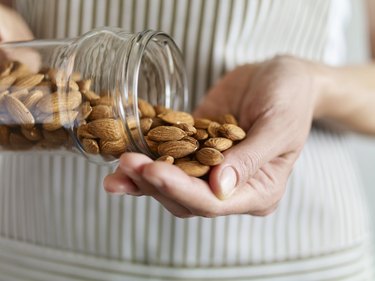
Nuts are super-nutritious snacks: They offer healthy fats, plant-based protein, fiber and a slew of vitamins and minerals that provide you with quick energy without any empty calories.
They have also been linked to a lower risk of heart disease, according to a November 2017 study in the Journal of the American College of Cardiology.
Video of the Day
Video of the Day
But quality can vary. When shopping for nuts, you may have come across organic and non-organic versions. This may cause you to ask questions like, "Do almonds need to be organic?" or "Do walnuts need to be organic?"
Why Organic Matters When It Comes to Nuts
Unlike conventionally grown foods, organic foods have the benefit of being grown without synthetic pesticides, herbicides and fertilizers (but note that there are approved organic pesticides, herbicides and fertilizers). Organic foods are also not allowed to be genetically modified in any way, according to California Certified Organic Farmers.
Buying organic protects consumers from potentially harmful side effects of pesticides, and some pesticides have been linked to cancer and hormone issues, as reported by the Environmental Protection Agency. Organic foods can be identified by the USDA Organic seal.
Like most plants, nuts can be subject to the potentially harmful effects of pesticides. Here are the most important nuts to buy organic.
Related Reading
1. Almonds
Many pesticide residues have been reported on conventionally grown almonds, according to the Pesticide Action Network North America. The use of insecticides and herbicides on California almonds both increased between 1996 and 2010, and this may have a negative effect not only on human health but also on the health of the environment, as reported by a February 2014 study in The Science of the Total Environment.
Buy Organic Almonds
2. Cashews
Cashews are another nut that may have a higher pesticide load than others. For example, dozens of pesticides, herbicides, insecticides and fungicides have been found to be used on cashews grown in Cote D'Ivoire, a country in West Africa that's one of the leading cashew producers, according to a November 2020 research in the International Journal of Research.
Buy Organic Cashews
- Navitas Organic Whole Cashews, 16 oz. ($14.99, Amazon)
- Yupik Organic Raw Cashews, 2.2 lbs. ($21.03, Amazon)
- Elan Organic Raw Cashews, 8-pack ($56, Bubble Goods)
3. Pistachios
Dozens of insecticides and pesticides might be used on conventionally grown pistachios, per the University of California Agriculture and Natural Resources. One type of pesticide used on pistachios called phosmet is linked to cancer, but more research needs to be done to confirm these effects in humans, per the U.S. Environmental Protection Agency.
Buy Organic Pistachios
- True California Organic Raw In-Shell Pistachios, 1 lb. ($19.99, Amazon)
- Nichols Farms Organic In-Shell Pistachios Roasted With Sea Salt, 2 lbs. ($35.99, Amazon)
- Elan Organic Sea Salted Pistachios, 8-pack ($60, Bubble Goods)
4. Peanuts
Peanuts are actually not a nut, but a member of the legume family, which also includes peas, beans and lentils. Unlike tree nuts, peanuts are grown underground, according to the National Peanut Board. This makes them especially susceptible to mold and fungi from moist soil, as well as increased exposure to pesticides that get absorbed into the soil.
Buy Organic Peanuts
What About Walnuts?
Walnuts have a very hard outer shell that offers protection from pesticides and other chemicals used on conventionally grown varieties. Conventionally grown walnuts have shown little pesticide residue on the shelled nut, according to the food advocacy organization FoodPrint.
No significant health risk was found from walnut pesticide residue, according to a February 2016 study in Chemosphere. But pesticides used in any non-organic farming are still hazardous to farmers and to the local environment.
- Journal of the American College of Cardiology: Nut Consumption and Risk of Cardiovascular Disease
- Unlockfood.ca: Understanding organic foods
- California Certified Organic Farmers: Organic is Non-GMO and More
- Center for Food Safety: GE Food and Your health
- Environmetal Protection Agency: Human Health Issues Related to Pesticides
- U.S Department of Agriculture: USDA Organic
- What's on my Food: Almonds
- The Science of the Total Environment: Spatial and temporal patterns of pesticide use on California almonds and associated risks to the surrounding environment
- University of Florida IFAS Extension: CASHEW APPLE FRUIT GROWING IN THE FLORIDA HOME LANDSCAPE
- International Journal of Developmental Research: Inventory of pesticides use in cashew nuts orchards in the north of Côte D'Ivoire
- UCIPM: Relative Toxicities of Insecticides and Miticides Used in Pistachios to Natural Enemies and Honey Bees
- Extoxnet: Phosmet
- Earth Justice: Phosmet
- Kids Health: Nut and Peanut Allergy
- National Peanut Board: How Peanuts Grow
- National Cancer Institute: Aflatoxins
- Food Print: Real Food Encyclopedia-Walnuts
- Chemosphere: Residue Levels and Risk Assessment of Pesticides in Nuts of China